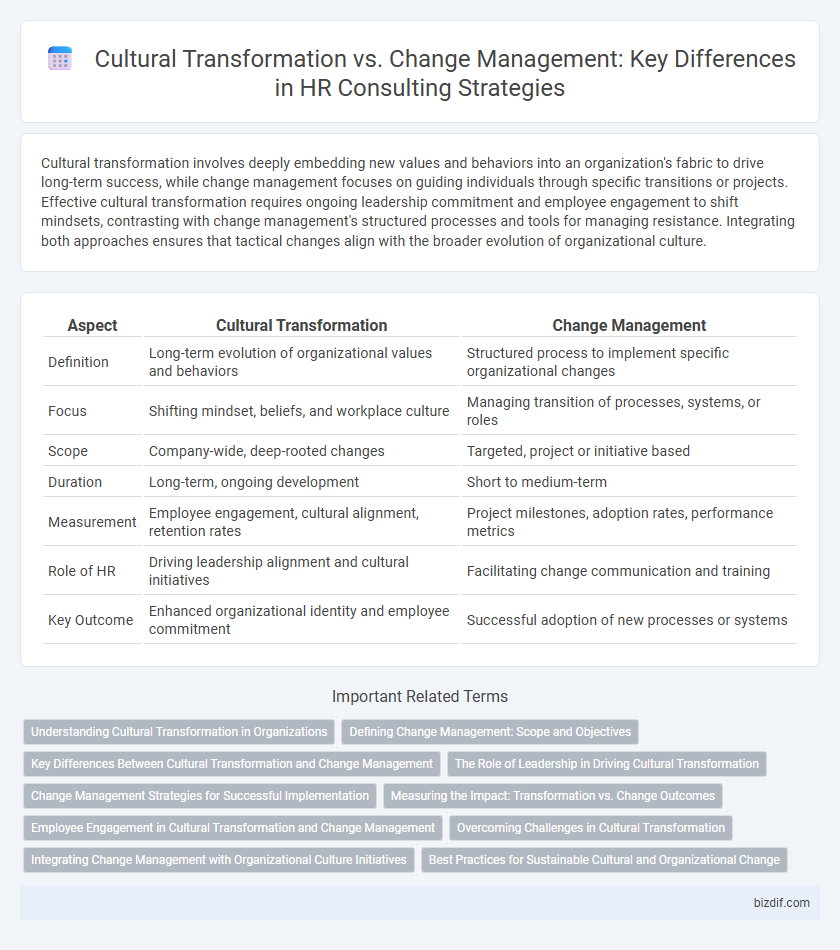Cultural transformation involves deeply embedding new values and behaviors into an organization's fabric to drive long-term success, while change management focuses on guiding individuals through specific transitions or projects. Effective cultural transformation requires ongoing leadership commitment and employee engagement to shift mindsets, contrasting with change management's structured processes and tools for managing resistance. Integrating both approaches ensures that tactical changes align with the broader evolution of organizational culture.
Table of Comparison
| Aspect | Cultural Transformation | Change Management |
|---|---|---|
| Definition | Long-term evolution of organizational values and behaviors | Structured process to implement specific organizational changes |
| Focus | Shifting mindset, beliefs, and workplace culture | Managing transition of processes, systems, or roles |
| Scope | Company-wide, deep-rooted changes | Targeted, project or initiative based |
| Duration | Long-term, ongoing development | Short to medium-term |
| Measurement | Employee engagement, cultural alignment, retention rates | Project milestones, adoption rates, performance metrics |
| Role of HR | Driving leadership alignment and cultural initiatives | Facilitating change communication and training |
| Key Outcome | Enhanced organizational identity and employee commitment | Successful adoption of new processes or systems |
Understanding Cultural Transformation in Organizations
Cultural transformation in organizations involves reshaping underlying values, beliefs, and behaviors to align with long-term strategic goals, fostering sustainable growth and innovation. Unlike change management, which addresses specific processes or structural shifts, cultural transformation targets the deeper organizational mindset and employee engagement. Effective cultural transformation requires comprehensive assessment, leadership commitment, and continuous reinforcement to embed new cultural norms throughout all levels of the company.
Defining Change Management: Scope and Objectives
Change management in HR consulting encompasses structured approaches to transition individuals, teams, and organizations from a current state to a desired future state, focusing on minimizing resistance and ensuring successful adoption of new processes or behaviors. The scope includes communication planning, training, stakeholder engagement, and impact assessment to align organizational culture with strategic goals. Objectives center on enhancing employee adaptability, sustaining productivity during transitions, and embedding changes into the organizational fabric for long-term effectiveness.
Key Differences Between Cultural Transformation and Change Management
Cultural transformation focuses on fundamentally reshaping an organization's values, behaviors, and beliefs to align with long-term strategic goals, whereas change management primarily addresses the structured process of implementing specific projects or changes. Cultural transformation involves a deep shift in organizational mindset and often requires sustained leadership commitment and employee engagement across all levels. Change management is typically more tactical and time-bound, concentrating on minimizing resistance and ensuring smooth adoption of new systems, policies, or procedures.
The Role of Leadership in Driving Cultural Transformation
Effective cultural transformation relies heavily on visionary leadership that models desired behaviors and fosters an environment of trust and collaboration. Leaders play a critical role in embedding new values by aligning organizational practices, communication, and performance metrics with the intended culture. Without committed leadership, cultural initiatives risk superficial adoption and fail to achieve sustainable change.
Change Management Strategies for Successful Implementation
Effective change management strategies involve clear communication, stakeholder engagement, and continuous feedback loops to ensure successful implementation of organizational changes. Leveraging tools such as change impact assessments and training programs helps align employee behaviors with new processes and cultural expectations. Integrating these strategies within the HR consulting framework enhances adaptability and drives sustained performance improvements.
Measuring the Impact: Transformation vs. Change Outcomes
Measuring the impact of cultural transformation involves assessing shifts in employee behaviors, values alignment, and long-term engagement compared to change management's focus on immediate adoption rates and project completion metrics. Key performance indicators (KPIs) for cultural transformation include cultural health surveys, employee sentiment analysis, and retention rates reflecting deep-rooted change. Change management metrics center around training effectiveness, process adherence, and immediate productivity improvements to evaluate short-term outcomes.
Employee Engagement in Cultural Transformation and Change Management
Employee engagement plays a pivotal role in both cultural transformation and change management, driving commitment and sustained behavioral shifts within organizations. Cultural transformation emphasizes deep-rooted shifts in values and beliefs, fostering intrinsic motivation and stronger employee alignment with organizational purpose. Change management focuses on structured processes to guide employees through transitions, ensuring clarity and support to maintain engagement during periods of uncertainty.
Overcoming Challenges in Cultural Transformation
Overcoming challenges in cultural transformation requires addressing deeply ingrained employee mindsets and aligning organizational values with strategic goals. HR consultants implement targeted communication strategies and leadership development programs to foster engagement and resilience during transitions. Embedding continuous feedback loops and leveraging data analytics enhances adaptability and sustains long-term cultural shifts.
Integrating Change Management with Organizational Culture Initiatives
Integrating change management with organizational culture initiatives ensures sustainable transformation by aligning new processes with core company values and employee behaviors. Effective HR consulting facilitates this integration through tailored strategies that embed change within the organizational culture, enhancing employee adoption and long-term performance. Leveraging culture as a catalyst in change management drives resilience and adaptability across all levels of the organization.
Best Practices for Sustainable Cultural and Organizational Change
Effective cultural transformation requires embedding new values into everyday behaviors and leadership practices, ensuring alignment across all organizational levels. Best practices emphasize continuous employee engagement, transparent communication, and integrating cultural goals into performance metrics to sustain change. Combining these with agile change management techniques enables organizations to adapt swiftly while maintaining a strong cultural foundation.
Cultural Transformation vs Change Management Infographic

 bizdif.com
bizdif.com